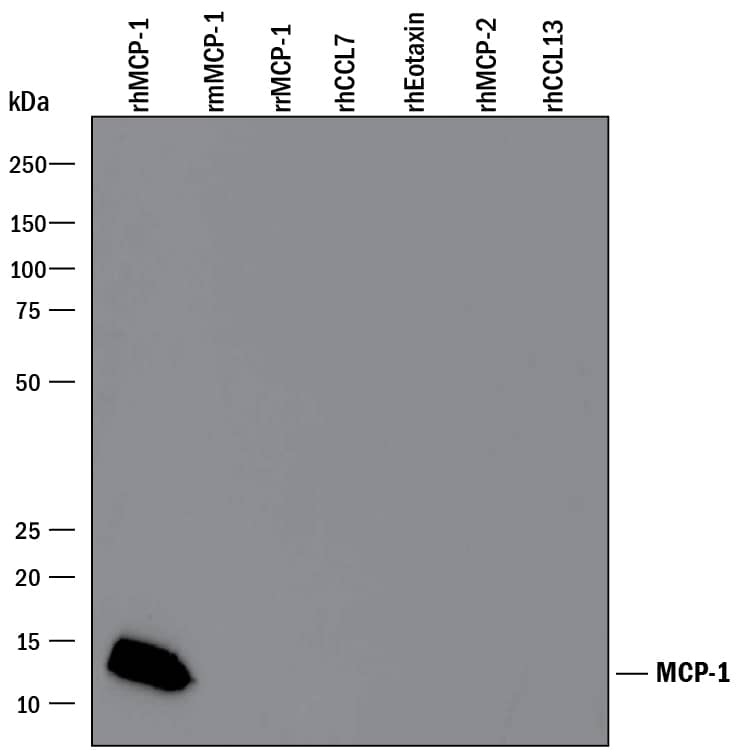Human CCL2/JE/MCP-1 Antibody
R&D Systems, part of Bio-Techne | Catalog # AF-279-NA


Key Product Details
Species Reactivity
Validated:
Cited:
Applications
Validated:
Cited:
Label
Antibody Source
Product Specifications
Immunogen
Gln24-Thr99
Accession # P13500
Specificity
Clonality
Host
Isotype
Endotoxin Level
Scientific Data Images for Human CCL2/JE/MCP-1 Antibody
Detection of Recombinant Human CCL2/JE/MCP‑1 by Western Blot.
Western blot shows 25 ng of Recombinant Human CCL2/JE/MCP-1 (Catalog # 279-MC), Recombinant Mouse CCL2/JE/MCP-1 (Catalog # 479-JE), Recombinant Rat CCL2/JE/MCP-1 (Catalog # 3144-JE), Recombinant Human CCL7/MCP-3/MARC (Catalog # 282-P3), Recombinant Human CCL11/Eotaxin (Catalog # 320-EO), Recombinant Human CCL8/MCP-2 (Catalog # 281-CP), and Recombinant Human CCL13/MCP-4 (Catalog # 327-P4). PVDF Membrane was probed with 0.1 µg/mL of Goat Anti-Human CCL2/JE/MCP-1 Antigen Affinity-purified Polyclonal Antibody (Catalog # AF-279-NA) followed by HRP-conjugated Anti-Goat IgG Secondary Antibody (Catalog # HAF109). A specific band was detected for CCL2/JE/MCP-1 at approximately 12 kDa (as indicated). This experiment was conducted under reducing conditions and using Immunoblot Buffer Group 3.CCL2/JE/MCP‑1 in Human Crohn's Disease Intestine.
CCL2/JE/MCP-1 was detected in immersion fixed paraffin-embedded sections of human Crohn's disease intestine using Goat Anti-Human CCL2/JE/MCP-1 Antigen Affinity-purified Polyclonal Antibody (Catalog # AF-279-NA) at 25 µg/mL for overnight at 4° C temperature followed by incubation with the Anti-Goat IgG VisUCyte™ HRP Polymer Antibody (Catalog # VC004). Before incubation with the primary antibody, tissue was subjected to heat-induced epitope retrieval using Antigen Retrieval Reagent-Basic (Catalog # CTS013). Tissue was stained using DAB (brown) and counterstained with hematoxylin (blue). Specific staining was localized to epithelial cells. View our protocol for IHC Staining with VisUCyte HRP Polymer Detection Reagents.Chemotaxis Induced by CCL2/MCP‑1 and Neutral-ization by Human CCL2/ MCP‑1 Antibody.
Recombinant Human CCL2/ MCP-1 (Catalog # 279-MC) chemoattracts the BaF3 mouse pro-B cell line transfected with human CCR2A in a dose-dependent manner (orange line). The amount of cells that migrated through to the lower chemotaxis chamber was measured by Resazurin (Catalog # AR002). Chemotaxis elicited by Recombinant Human CCL2/MCP-1 (150 ng/mL) is neutralized (green line) by increasing concentrations of Goat Anti-Human CCL2/MCP-1 Antigen Affinity-purified Polyclonal Antibody (Catalog # AF-279-NA). The ND50 is typically 1.5-4.5 µg/mL.Applications for Human CCL2/JE/MCP-1 Antibody
Immunohistochemistry
Sample: Immersion fixed paraffin-embedded sections of human Crohn's disease intestine
Western Blot
Sample: Recombinant Human CCL2/JE/MCP-1 (Catalog # 279-MC)
Neutralization
Reviewed Applications
Read 4 reviews rated 4.8 using AF-279-NA in the following applications:
Formulation, Preparation, and Storage
Purification
Reconstitution
Formulation
Shipping
Stability & Storage
- 12 months from date of receipt, -20 to -70 °C as supplied.
- 1 month, 2 to 8 °C under sterile conditions after reconstitution.
- 6 months, -20 to -70 °C under sterile conditions after reconstitution.
Background: CCL2/JE/MCP-1
CCL2, also known as monocyte chemotactic and activating factor (MCAF), was initially purified independently by two groups based on its ability to chemoattract monocytes. The human CCL2 cDNA encodes a 99 amino acid residue precursor protein with a 23 residue hydrophobic signal peptide that is cleaved to generate the 76 residue mature protein. Natural CCL2 is heterogeneous in size due to the addition of O-linked carbohydrates and sialic acid residues. In addition to fibroblasts; tumor cells, smooth muscle cells, endothelial cells, and mononuclear phagocytes can also produce CCL2 either constitutively or upon stimulation by various stimuli. CCL2 is a member of the beta (C-C) subfamily of chemokines. The existence of MCP-2 and MCP-3 with 62% and 73% amino acid identity respectively, to CCL2 have been reported. Consistent with it being a member of the chemokine beta family, CCL2 has been shown to chemoattract monocytes. In addition, it will also activate monocytes to be cytostatic for some human tumor cell lines; to increase cytosolic free calcium; to generate and release monocyte superoxide anions and to release monocyte lysosomal enzymes in vitro. CCL2 was reported to be capable of regulating adhesion molecule expression and cytokine production in human monocytes as well as chemoattracting, activating, and inducing histamine release from basophils. The biological roles played by CCL2 in a number of inflammatory and non-inflammatory disease states characterized by the accumulation of leukocytes at the site of the lesion, including atherosclerosis, delayed hypersensitivity reactions, etc., are being determined. CCL2 can bind to the C-C chemokine receptor-1 that also binds MIP-1 alpha, RANTES and MIP-1 beta. A specific receptor for CCL2 has also been cloned from THP-1 and MonoMac 6 cells.
Alternate Names
Gene Symbol
UniProt
Additional CCL2/JE/MCP-1 Products
Product Documents for Human CCL2/JE/MCP-1 Antibody
Product Specific Notices for Human CCL2/JE/MCP-1 Antibody
For research use only

